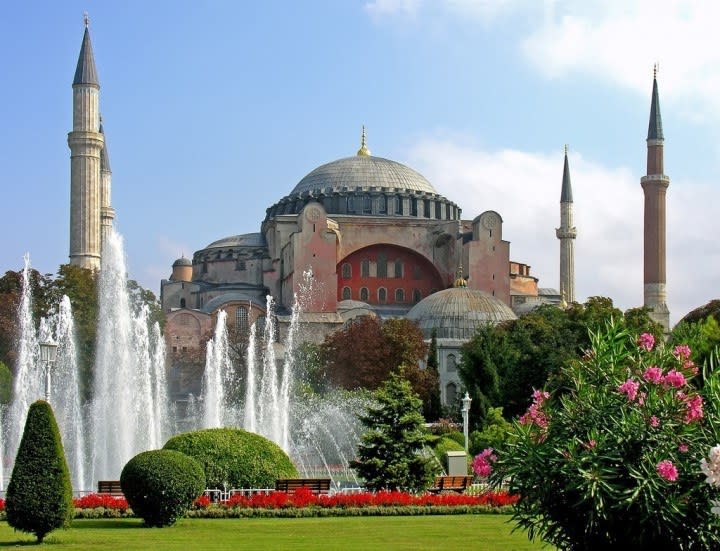This entrepreneur left a 20-year corporate career to change the way Muslims travel

Fazal Bahardeen does not have the typical profile of an entrepreneur. He left his native country, Sri Lanka, at the age of 20 to pursue higher education in China. After graduating with an engineering degree, he accepted a job with French telecommunications company Alcatel (now Lucent) based in Beijing. Behardeen went on to dedicate 20 years of his life to the firm, spread across roles in Beijing, Paris, Shanghai, Hong Kong, and Singapore.
One thing that constantly irked Bahardeen, a practicing Muslim, during his travels was the lack of sensitivity for Muslim travelers’ needs. Hotels didn’t serve Halal food and there were no privacy arrangements for families. Prayer rooms were few and far between. “Sometimes, during [the fasting month of] Ramadan, I would carry my own packaged food as Muslim meals weren’t available,” he recalls.
For someone who spent “half his time in hotel rooms” this was an urgent, pressing issue with few solutions.
Despite these concerns, Bahardeen still had a comfortable, steady, and well-paying job. There was no need for a fundamental transformation and a radical career shift. However, he yearned for change.
In the mid-2000s, Alcatel was merged with Lucent. This gave Bahardeen the opportunity he needed to leave the corporate world and work on something he truly believed had to be solved. “The more experienced I got [in traveling], the more I understood the difficulty. I needed to do something. I wanted to rate hotels; that was my primary objective,” he stresses.
At the same time, Bahardeen undertook a postgraduate diploma course in Islamic Banking and Finance. This exposure helped him realize that Muslim consumers were increasingly looking for products and services catered to their requirements. He decided a rating system was necessary; it would help Muslims understand how Muslim-friendly their tourist destinations were, whilst also assisting destinations cater to these specific needs. CrescentRating, a B2B service for consultancy, research, training, and ratings formally launched in 2008.
What do Muslim travelers want?
Bahardeen says CrescentRating ranks destinations on a number of different criteria before settling on a particular rating. The most important categories are availability of Halal food and prayer areas. “If you cannot provide these, do not waste money targeting Muslim travelers as it isn’t sustainable. These two things are non-negotiable for Muslims traveling abroad,” he stresses.

Fazal Bahardeen
Other important needs are availability of water for ablution, toilets, and privacy for services such as swimming pools and gyms. “A growing number of Muslim travelers want to know whether hotels offer separate male and female timings. We’re trying to help hotels understand this need,” he says.
Untapped market
Despite having a significant early-mover advantage, he found the going tough. This was a completely unknown concept for most people in the travel industry. They were unaware of Muslim needs, and while they were eager to attract more tourists from Muslim countries, they weren’t doing much to provide specific services to suit their needs. Bahardeen had to do a lot of groundwork, meeting with property owners, restaurants, government agencies, and travel agents to convince them of the effectiveness of his upcoming service. “Not many people wanted to listen,” he adds.
One thing which worked in the entrepreneur’s favor was his corporate background. He understood business dynamics and what made them tick. He was able to communicate with key stakeholders in a manner that resonated with them. However, for people to take him seriously, he needed to foster trust and legitimacy.
“We spoke at conferences, conducted workshops with tourism boards, and published reports in an effort to position ourselves as the leading authority on Muslim travelers,” says Bahardeen. “We were the world’s first rating system to determine whether destinations were Muslim-friendly, and essentially developed the market.”
There’s certainly massive potential in this sector. A report by CrescentRating suggests the Muslim travel market to be worth US$145 billion as a total of 108 million Muslims take vacations every year, representing 10% of the entire industry. By 2020 this is expected to rise to US$200 billion with 150 million travelers. Growth in the segment is dictated by the rapidly-progressing economies of Indonesia, Malaysia, Turkey, and Gulf countries. They’re becoming too big for tour and travel operators to ignore.
CrescentRating’s latest report is a glossary aimed at explaining travel-specific terminology for the Muslim travel segment. As faith “increasingly influences the purchasing decisions of Muslim consumers,” the report tries to explain terms such as Wudhu, Salah, etc to properly describe corresponding needs and practices. “We have witnessed in the past few years, as the market has been growing, there have been many new terms to describe Muslim requirements. This [glossary] is an attempt at a universally agreed definition,” explains Bahardeen.
See: Muslim cuisine just got social. HalalTrip lets you spot and share halal food
Partnerships and services
Earlier this year, CrescentRating earned a major coup as it entered into a strategic partnership with MasterCard. The arrangement marks the evolution of CrescentRating’s flagship annual report, which was first published in 2011. From now on the report will be known as the Global Muslim Travel Index, co-authored by both companies. The 2015 report is a comprehensive analysis of the state of global Muslim travel; it lists the most popular destinations, provides guidelines for safe environments, and has a wealth of data pertaining to the segment. The partnership firmly establishes CrescentRating as the world’s leading authority on Halal-friendly travel.

However, Bahardeen isn’t resting on his achievements.
The entrepreneur’s next venture is HalalTrip, an in-depth information guide and resource for destinations across the world. Bahardeen says his aim for HalalTrip is to position itself as a “TripAdvisor for Muslim travelers.” On the site, travelers can book hotels, flights, tour packages, and browse through content. “Everything is specifically catered for Muslim needs,” he says.
HalalTrip works with Booking.com, so it has their entire repository of 360,000 hotels available for searching. However, the unique aspect is that search results will show hotels recommended by CrescentRating as well. If users want to know more, they can click on ‘show details’, and the site will tell you what facilities the hotel has specifically for Muslim travelers. Each property is personally reviewed and rated by the team. It will also reveal nearby Muslim-friendly landmarks, such as Halal restaurants and mosques.
Another service launched recently by Bahardeen is Muslim Travel Warehouse, a B2B travel aggregator for Halal tourism packages and activities. The idea behind the portal is to bring suppliers and distributors closer together.
“What we have seen in the past few years is that there was a huge gap in the market for a B2B marketplace,” explains Bahardeen. “With [Muslim Travel Warehouse] we work with operators worldwide to develop tour packages for Muslim travelers. Each package is examined by the CrescentRating team to ensure suitability.”
Currently Muslim Travel Warehouse offers 25 different destinations, with the main markets being Malaysia, Saudi Arabia, Pakistan, and Bangladesh. However, France, UK, Germany, and Austria are fast emerging as Muslim-friendly destinations for those wishing to travel to Europe.
Bahardeen reveals his major focus in the coming months will be to accelerate growth of HalalTrip and Muslim Travel Warehouse. Mastercard is also interested in helping increase traction around these platforms, as they’re the payment partner. “We’ve established trust and legitimacy through CrescentRating and the Global Muslim Travelers Index. Now it’s important to build on that,” he says.
Despite everything he’s done so far, Bahardeen remains humble and soft-spoken. “I didn’t know much about entrepreneurship, but was eager to learn and expand,” he says. His advice for others trying to make a mark? “Work hard, do the best for things that are in your control, and hopefully everything else will fall in place.”
See: Despite dropping out of college, this inventor was recognized as one of the world’s brilliant minds
This post This entrepreneur left a 20-year corporate career to change the way Muslims travel appeared first on Tech in Asia.



